#miranda analysis
Text
some quick notes on miranda
(long ass post warning and i didn‘t edit this because my executive function disorder brain won‘t allow it so no beta we die like men)
contrary to what some people might believe, miranda doesn‘t think she is superior to other people because she‘s genetically modified. look what she says here:
‚You should know I‘ve had extensive genetic modification. Not my choice, but I make the best of it.‘
miranda doesn‘t seem to feel guilty for it, because it wasn‘t her choice. but she also doesn‘t feel like she‘s superior for having perfect genetics (which i feel a lot of people accuse her of), because she knows she only has those because her father paid for it. it isn‘t something she can take credit for. i think she knows she‘s got ‚unfair‘ advantages but she doesn‘t dwell on it - she makes the best of it. she‘s not ashamed to point it out, because it‘s just a fact - if other people interpret her stating the facts as her being cocky and feeling superior to others, that‘s their fault for falsely interpreting what she says. i also think she likes to point out how she‘s good at everything because before joining cerberus her whole life she believed she was a failure - her father constantly criticized her and picked her apart her entire childhood, how could she not believe she was a failure at everything she did?
that time when miranda instantly mentions what she is capable of (‚worried about my qualifications? i can crush a mech with my biotics or shoot its head off at a hundred yards. take your pick.“) isn‘t her bragging. it is miranda preemptively assuming that shepard is potentially doubting her qualifications. because her entire childhood miranda was constantly fighting a battle - constantly having to prove herself to her father. so before shepard even gets the chance to express any doubts, miranda makes sure to tell him what she is capable of because she doesn‘t want to be in that unpleasant position again of having someone doubt her. because she knows she is not the failure her father claimed she was.
she‘s still so traumatized from constantly being criticized, that she just instantly assumes shepard is worried about her qualifications. even though there should be no reason why shepard should be worried about her qualifications right from the start without a proper reason. it‘s the mindset abuse victims have.
miranda isn‘t bragging when she mentions her capabilities. she‘s just avoiding being vulnerable, or she is responding to questions - such as that time when she mentions what benefits she had from her modifications because shepard asked. she wouldn‘t have listed it off if shepard didn‘t ask - which is exactly what conceited people do who like to brag.
miranda, in my opinion, even downplays her modifications. when shepard asks what level of modification she‘s talking about she says
‚It‘s very thorough. Physically, I‘m superior in many ways. I heal fast and I‘ll likely live one time and half again as long as the average human. My biotics are also very advanced - for a human. Add to that some of the best training and education that money could buy and well, it‘s pretty impressive really.“
she‘s got far more modifications than just her lifespan, faster healing and biotics. if miranda really were that conceited she could have listed them all but she didn‘t. she gave shepard a quick run down of the most relevant ones (biotics and healing for instance are relevant to mention because it matters in a combat setting). she‘s not even mentioning her genetically modified intelligence here. she doesn‘t mention that until later. note how she also adds her biotics are only strong by human standards. would a person that is so conceited really mention that? if she were so conceited and self obsessed she‘d use every opportunity to get to brag. and she‘d definitely be mentioning something like superior intelligence much earlier if that were the case.
the rumor that miranda thinks she‘s something better because of her perfect genetics is definitely just a myth, and whoever claims she‘s bragging all the time is wrong
#mass effect#miranda lawson#chatacter analysis#notes on miranda#miranda analysis#no beta we die like men#miranda character study
24 notes
·
View notes
Text
okay so we are all familiar with the cover of Hamilton, right?
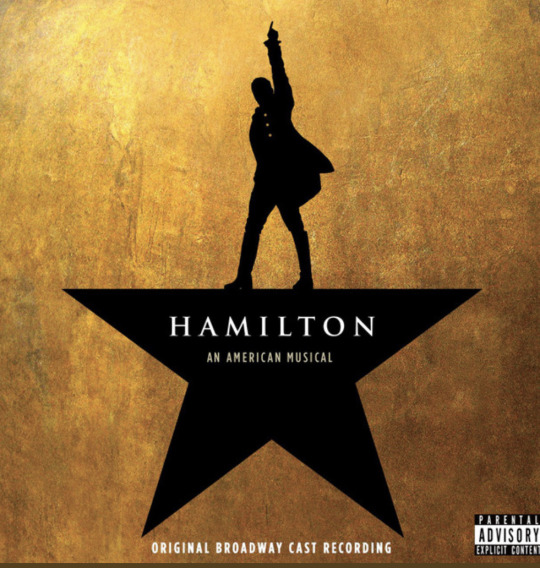
He's standing there with one arm raised, pointing towards the sky
and at first look, it's a power stance, he's defiant, he's confident
but if you think about it just a little bit more than that
at the end of the musical, at the end of his life,
when he is dueling burr,
where did hamilton point his gun?
he pointed it at the sky.
the cover pose is not a power stance.
#I HAD THIS THOUGHT TODAY AND I HAD TO SHARE#ITS HORRIBLE#LMM YOUR MIIINNDDDD#ITS GENIUS#HAMILTON#hamilton musical#lin manuel miranda#hamilton analysis#hamilton an american musical#alexander hamilton
148 notes
·
View notes
Note
Who of the Cast could hold a grudge for the longest?
On a scale from "Not Even Worth the Energy" to "I Will Make How You've Wronged Me My Whole Personality":
Sunni
Miranda
Jay
Jesse
Zane
Skylor
Antonia
Pixal
Cole
Nya
Kai
Lloyd
Harleigh
Olivia
Harumi
. . .
I don't even think Sunni is capable of holding a grudge. She's cool with her future boyfriend eventually dumping her for another woman, for Master's sake. She can tank a lot of emotional damage. Like a sponge.
Miranda won't even remember you wronged her unless you remind her, and even then she has to think about if you're worth being pissed off at. You're usually not—she's not more important things to keep on her mind. She's definitely 'forgive and forget'.
Jay, Jesse, and Zane are all extremely petty, mind you. But, while Jay is more vocal with his, he'll almost never do a thing about it unless pushed, especially if it's something he considers minor.
Jesse is only petty when it comes to very specific things—more potently yet less often than Jay, but he also doesn't usually act on it. Usually.
Zane, meanwhile, might not let his pettiness show as much as the previous two, but he is actually far more likely to act on it.
Skylor and Antonia are more vocal about their grudges than the previous three combined, and will act on it if an opportunity prevents itself (or they're isn't stopped beforehand). Can be rather easily swayed into letting bygones be bygones though—less stress for them. Skylor is slightly lower because she doesn't want to start any fresh trouble for herself ; Antonia will without a second thought.
Pixal is the wild card. She's either dismissed her grudges as entirely unnecessary...or is filing it away to use against you later. You'll never know until it's too late.
...Cole forgives, but does not forget. Don't you forget that.
Nya and Kai are about the same, just in opposite directions. Nya's grudges only fester against her better judgement because they make her so frustrated (which her element feeds on), while Kai's grudges come from his vigilance + a fear of broken trust. Neither are going to let you off the hook easily by any means, but they do have some leeway to them.
Lloyd has an outstanding capacity to forgive, but he's also not going to give it to you without rightfully (and vigorously) reminding you of what you did to wind up in his bad graces to begin with. Forgive but don't forget, yet taken to the extreme.
Harleigh's been wronged her whole life and her grudges literally haunt her, but unlike the following two, she is eventually able to pull herself out of it. ...Somewhat.
Olivia: "JUST LET IT GO ALREADY!!" "NEVER!!!!!"
Harumi: ...Don't forgive, don't forget
#info tag#legacyverse#ninjago headcanons#kai smith#lloyd garmadon#jay walker#zane julien#cole brookstone#nya smith#oc: jesse marvell#antonia sawyer#harumi hutchins#oc: miranda marvell#oc: olivia omar#skylor chen#pixal borg#oc: sunni dayes#oc: harleigh kognito#i feel like this answer was obvious#so i did a bit of analysis for flavor
35 notes
·
View notes
Text
Whickber Street and beyond (sorry this is so long!!)
I have A LOT of questions. Like so many questions.
The Whickber Street of S1 is so different from the Whickber Street we see in S2.
This is what we got in S1. Muted colors, concrete and steel, and overcast skies. Nothing about Whickber Street stands out in S1. It's dull and drab.
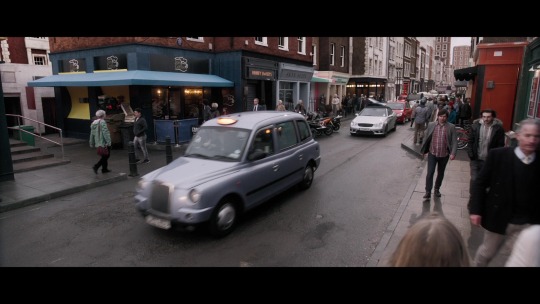


Compare that to the Whickber Street we see in S2.
The sun seems to be shining most of the time. People are wearing bright colors. There are trees.
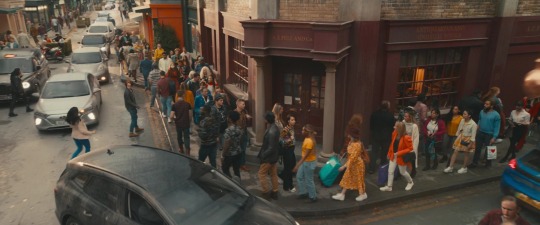
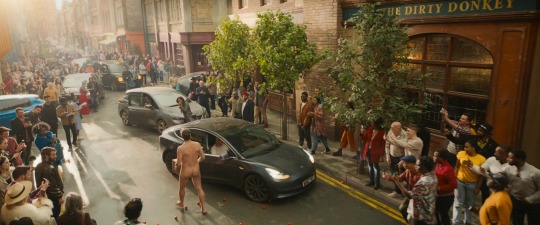

Whickber Street seems to be a small island of paradise and a safe place for everyone who ventures there.
What is happening here? Is this because Adam changed reality after the failed apocalypse? Why do we never see anyone spend money?
Is this the peaceful existence that Aziraphale and Crowley have carved out for themselves?
Or is someone else pulling all the strings?
When Crowley questioned Nina about the name of her coffee shop, she said all the other names were taken.
Mutt runs the magic shop that Aziraphale and Crowley visited in 1941, and we all know the original owner was eaten by the Nazi zombies. The magic shop still looks very much like it did in 1941 too.
It's strange that there is a French restaurant, and French is the only language in the world that Aziraphale isn't fluent in.
Maggie runs a record shop even though no one buys records anymore, but it's where Aziraphale gets his music.
How long has the Dirty Donkey been an elevator for Heaven and Hell?
Nina seems to be the only character who ever notices that things on Whickber Street are...strange? She immediately notices that things are weird when she walks into the shopkeepers meeting. She was upset that she wasn't upset because she knew she had a reason to be upset. She constantly questions why Maggie owns a record shop because no one buys records.
She even says she would be more worried about someone breaking into the record shop to leave more records, and Maggie has gained A LOT of copies of "Every Day" that she's never going to be able to sell.
It's weird that she ends up with all the extra copies of "Every Day" from a pub in Scotland and it happens to be a clue that leads Aziraphale to investigating what might have happened to Gabriel.
The very place where the Gabriel statue exists. The one they were standing in front of when Crowley was pulled back down into Hell after preventing Elspeth from killing herself. The one Aziraphale was standing in front of when he was having that exact memory and says that was the last time he was to see Crowley for a long time.
Why did he end his diary entry with that sentence when it had only been a month since they had been to Edinburgh? Did he write that or was it an afterthought?
Why does Gabriel seem to be a harbinger of doom for Crowley and Aziraphale?
What's the significance of faces? Is all of this a dream?
Gabriel lost his memory and Aziraphale names him Jim to avoid confusion. Aziraphale and Crowley did a miracle that would ensure no one would recognize Gabriel/Jim even if they were looking for him.
Is this something that has been done to Aziraphale and Crowley when you see all the other familiar faces?
Maggie shares a face with the Chattering Nun that Hastur killed.
Nina shares a face with the Chattering Nun who became successful after their order was dissolved.
Furfur shares a face with Shakespeare and Shax shares a face with Madame Tracy.
Why do Aziraphale and Crowley not notice? I can understand them not noticing Maggie's face because we didn't see either of them interact with her in season one because Hastur killed her. But Crowley remembered Mary as the nun he met when he met her in season one, but he doesn't notice anything familiar about her face now? She mistakes them for a couple in both seasons.
Aziraphale literally lived in Madame Tracy's body for a short while after he accidentally got himself discorporated. It's not a face he or Crowley would forget because she was there when they averted the apocalypse. Why would they not notice that Shax shares her face?
Aziraphale was friendly with Shakespeare and loved his plays and Crowley did a miracle as a favor to Aziraphale so that Hamlet would be a success.
All four of these faces are in Aziraphale's bookshop on Whickber Street at the same time in the final episode.
Am I overthinking all of this? My brain refuses to accept that these actors returned to the show but in different roles for no reason at all.
So many things about the present day in season two just don't add up, and I think it's intentional, but it's going to drive me crazy until I have answers.
Will Aziraphale's absence on Whickber Street change things?
Is that the tempest Gabriel was referring to? The Metatron tempted Aziraphale back to Heaven by making him believe he would be able to work with Crowley.
And then great storms. Will his absence mean the weather is no longer perfect?
And the dead will walk the Earth once more.
Are the people on Whickber Street more than what they seem?
If anyone else actually reads this, are these the same questions you have as well??
#good omens#good omens 2#good omens meta#good omens analysis#good omens theories#crowley#aziraphale#ineffeble husbands#ineffable idiots#good omens gabriel#maggie service#nina sosanya#miranda richardson#reece shearsmith#madame tracy#shax good omens#furfur good omens#good omens shakespeare#whickber street#i just have so many questions#and i'm going to explode if i don't ask them#so i'm asking them#sorry this is so long
55 notes
·
View notes
Text
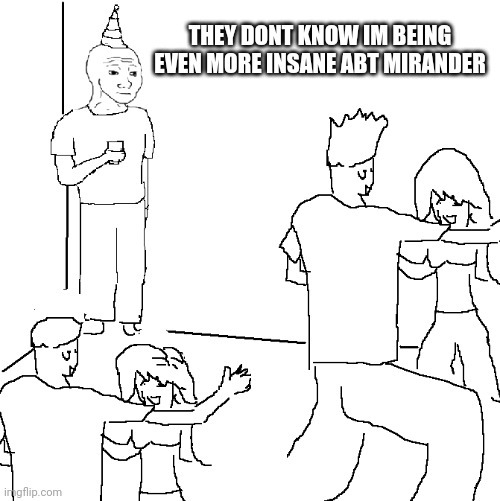
IM COOKING THE POST. IM COOKING IT.
35 notes
·
View notes
Text
Resident Evil Biohazard, Village, and the Cycle of Toxic Family Bonds and Abuse
Resident Evil 7: Biohazard, and its sequel, Resident Evil: Village, revolve around protagonist Ethan Winters as he tries to protect his family from forces he previously had no idea existed. The forces in question are an extended family suffering toxic bonds to each other- bonds both physically and emotionally poison. The core theme of the games is the cycle of toxic familial relationships, and the breaking of that cycle.
To fully understand the cycle of abuse that this story details, it’s important to look at each member of the family. The family tree starts with Mother Miranda, branching down into Alcina Dimitrescu, her three daughters Bela, Cassandra and Daniela, Karl Heisenberg, Salvatore Moreau, Donna Beneviento and Eveline. From Eveline, the family branches off into the Baker Family, with Jack, Marguerite, Lucas, and, by force, Mia. Zoe is still a Baker, but has been ousted from the rest of the family. The Bakers and the Lords are separate and never meet, connected only by Eveline, but it is Eveline who continued the cycle with the Bakers after learning it from Miranda.
Eveline was created as an attempt to bring back Miranda’s deceased daughter, but Miranda rejected her as her daughter because of her obsession with a family that made her violent- refusing to see that this obsession mirrored her own (such as when she was so obsessed with her own plan for her family that she gave up on reviving Eva at the end of Resident Evil Village and planned to just raise Rose as her own.) The flaws in other people were unacceptable, but in herself, they didn’t exist. Her obsessions, her hastiness, her tendency for unnecessary violence were left unacknowledged, but shunned and punished in other people, such as Moreau’s lack of affection in the family due to how deeply he wanted to be accepted, or Alcina being condescended to for warranted anger. Anyone flawed was not her true child, also shown by how she referred to The Four Lords as her false children and thanked Ethan for disposing of them once they were dead.
When her mother hastily disowned her, Eveline sought family in different places. She found it in her handler Mia Winters, and eventually in the Baker Family, overcompensating with a bigger family to make up for the one she didn’t get in the first place. No amount of family was enough for her- despite having Mia as a mother figure, she wanted Marguerite too. After she took the Bakers and had Jack as a father, she wanted Ethan too, and when Ethan arrived he found that she had been orchestrating multitudes of kidnappings via the Bakers to expand the family. Jack, Marguerite and Lucas had their worst traits amplified via an obsession with being Eveline’s family, and due to never having a model for what a loving family should look like, Evie didn’t understand why it never appeased her.
Despite wanting to constantly bring more people into the family to fill this hole, from the very beginning Evie ousted Zoe from the rest of the Bakers by not fully infecting her. She took just enough of a hold on her that she couldn’t leave, but left her consciousness fully untouched, leaving her helpless to watch her family descend into madness. Eveline purposefully set herself up as the family’s golden child and Zoe as the scapegoat. She taunted her and had her face scribbled out in pictures of her around the house, and influenced the other Bakers’ to shun and antagonize her. All of this to punish her for having a family of her own when Eveline didn’t. Zoe was rejected just as Miranda rejected Eveline.
The Bakers as a whole were forcibly cut off from society when infected by Eveline, their neighbors and other relatives having no idea where they went, and while Evie likely didn’t actually learn this act from Miranda, it was her mother who began the cycle of isolation as well. Miranda, however, was much more manipulative and sinister in her methods, whereas Eveline did the only thing she ever knew how to. Miranda forcibly took The Four Lords as her family, and while the timeline is unclear, it’s implied Heisenberg and Moreau were taken as children and Donna and Alcina as adults. All four lords were mutated and manipulated, cut off from any chance at a life outside of her care.
Moreau’s intense mutation led Miranda to be the only one he could possibly rely on, as the other lords thought him too repulsive. He has the emotional intelligence of a child, weeping often and wanting only for his mother to be proud of him due to how Miranda had isolated him from everyone with his mutation, reminiscent of a mother who refuses to let her child leave the nest and shelters them too heavily from the world to create an unhealthy reliance. Moreau has no self confidence and little social skills, and because of his monstrous appearance, he can’t go anywhere else.
Donna’s parents committed suicide when she was young, exacerbating her own mental health issues, and this left her already struggling to make connections with anyone. She did, however, have a confidant in her family gardener, who looked after her like a father might. When Miranda mutated her, she gave her the motherly love she lacked and gave her more confidence. With this gift, Donna became reliant on Miranda as her mother, unaware that she only ever intended on using her as part of her research. Donna’s loyalty was ensured in this way, and because she already felt isolated from the rest of the world, Miranda made certain she wouldn’t ever leave her.
Alcina was taken as a fully grown adult- she had a life outside the village, unlike the other Lords. We know this because of the jazz album Ethan has in his home. It’s seemingly inconsequential, but it implies a rich and full life before Miranda. Obviously wealthy due to her Dimitrescu lineage and her music career success, she was set up in style, and no doubt had an active life as a socialite. All of this was taken away when Mother Miranda lured her into the Dimitrescu Castle and mutated her. Obviously unable to rejoin normal society with her new need to drink blood and her intense height, Alcina HAD to rely on Miranda from there on out. Miranda was not her mother, and her parents had died only recently when she was a grown woman, but she had no choice but to stay with her. She clearly made the most out of her life, but often expressed anger over having to play family with the other lords, who were much younger than her. She reads as a put upon eldest daughter by a mother who expects too much- simultaneously expected to be a second parent and treated like a child.
Alcina also continued the cycle of abuse when she frequently lashed out at Heisenberg. It was likely due to resentment over a multitude of things, such as his lack of apparent mutations, being made to play family with him, and being made to go along with him on any plans despite being likely decades older and the only control in her life being her duties as a lord. This also leads back to the Golden Child and the Scapegoat- Heisenberg was a wildcard and a rowdy child who often lashed out, and Alcina was the perfect eldest daughter who did everything for the family even if she didn’t like it. Miranda purposefully created a rift between them with this dynamic, making Heisenberg infuriated by having to show deference to Lady Dimitrescu, and Lady Dimitrescu feeling belittled by having to play equal with Heisenberg.
It isn’t known exactly what Karl’s family situation was prior to Miranda, but we do know that he was kidnapped. Whether he was kidnapped as a child or an adult, he knows he was kidnapped, he knows Miranda’s entire family is fake, and he knows that he hates her. Interestingly, Heisenberg is in a unique position- he doesn’t need Miranda. His mutation is only internal, and just by looking at him you wouldn’t notice he was any different from any non mutated human being. He hates Miranda and doesn’t rely on her emotionally. The only thing stopping him from leaving is Miranda’s physical prowess, and we see him actively trying to circumvent this and escape.
Unfortunately, Heisenberg’s downfall is that he continues the cycle of abuse when he tries to use Rose as a weapon against Miranda instead of trying to protect her, doing the same thing to her that Miranda did to him. He was a weapon, one of her guardsmen, and so it was only logical to him that Rose should be the same, because it was all he knew.
Ethan is ultimately the one to break the cycle. Coming from the outside of this world, or from a different family dynamic, he clearly knows what a loving and functioning family is supposed to look like. He’s appalled by how the family he goes against works- he watches them hurt each other and tear themselves apart both physically and emotionally, and walk it off like it never even happened. Even Zoe’s behavior shocks him. Despite being the most normal of them, she’s fully desensitized to the horror of it all, and laughs when he’s frightened by her family. She doesn’t realize she’s trapped in the cycle too until she’s finally freed from it in End of Zoe, when Joe shows her the first bit of familial love she’s seen in three years. Mia is still trapped in this cycle and nearly pulls him into it with her mistakes (in the literal sense, yes, Mia being forced into playing mom for a bunch of moldy strangers doesn’t seem like her being trapped in a cycle of abuse, but consider it from the perspective of meeting your wife’s family only to wonder why she still talks to any of these people), but he manages to pull her out. The two are still shown to struggle with her secrecy and her avoidance (especially because she didn’t tell him he was dead, and he didn’t realize her hostility was Miranda’s acting), but it’s clear Mia is better off than when she was stuck with the Bakers.
This carries into their daughter- she’s only an infant, but they already want the world for her. Ethan risks everything just to rescue her from people he would likely never dream of facing otherwise. He suffers terrible pain at the hands of the “family” he married into just to save Rose from them, and ends the cycle completely when he rejects Heisenberg’s plan and kills Miranda himself. He sacrifices himself so that Rose doesn’t have to ever be caught in that cycle. It doesn’t matter to him that she has powers, or that he isn’t alive and she came back from the dead, or that his family is absolutely nothing like what he thought it would be. What matters is he loves her, he loves Mia, and he’d love them no matter what. It’s even his love for Rose that inspires her to deny the cycle another start and accept herself as she is in Shadow of Rose. Even if he didn’t raise her himself, he made sure she was with someone who would protect her, and he ended the cycle of abuse started by Mother Miranda before it could ever touch her.
#story analysis#character analysis#abuse mention#resident evil#resident evil village#resident evil 8#resident evil 7#resident evil biohazard#mother miranda#Eveline#zoe baker#ethan winters#mia winters#rose winters#jack baker#marguerite baker#lucas baker#alcina dimitrescu#lady dimitrescu#karl heisenberg#salvatore moreau#donna beneviento#I’m so insane about this game hope this helps
262 notes
·
View notes
Text
Going from only knowing about Monster Prom through fan content and some YouTube let’s-plays to actually playing the game myself made me go from thinking Miranda was the least interesting character to realising how cool and funny she is and having her be my absolute favourite character, and I couldn’t be happier <3 If Miranda had 1 fan it would be me and if she had zero fans I would clearly be dead!! And I’m really NOT saying this because I would be executed if I went against the Vanderbilt monarchy!!!
#i have a strong love-hate relationship with monster prom but i love trying to get all the endings >:)#i can only play on the weekends but so far i have 14 endings! taking every character to prom and getting rejected by every character count#as only two endings i think.#i also love miranda vanderbilt and its so silly but i look forward to seeing her TToTT is this what people with waifus feel like /j#every now and then i just go “i love miranda. did you know that?” to my sister and then every time i explain in great detail why#maybe one day ill write a character analysis… i like doing those. but not today!#rare ranch gamer post#not fish
24 notes
·
View notes
Text
Excuse my lack of coherent thoughts: I stayed up until 2am to watch Tick, Tick... Boom and OH MY GOODNESS.
I have been crying for hours. It's so hopeful but so sad and knowing what happened to Jonathan Larson in real life... it's too much.
The music is superb (hehe that's a pun), and I added a lot of the songs to my playlist.
The trials and tribulations of being an artist is very relatable. Though I'm not a professional, having been in theater, band, and being a fanfic author made a lot of the artist jokes hilarious and painfully accurate.
Andrew... oh, Andrew. He was incredible!! The singing, acting, everything! I can definitely see why he got nominated for an Oscar. (Though it was the same year as Benedict Cumberbatch, so it's a conflict of interest for me XD. Both, both is good.)
The acting in general was amazing! And the music numbers. Basically everything! (Have I said that?)
I laughed, I cried: It's definitely in my top 5 favorite movies!!
As a theater kid, I loved the Lin Manuel Miranda (and some of his Hamilton cast) cameo!
I just, I can't with this movie. Go watch it!!
#andrew garfield#tick tick boom#jonathan larson#lin manuel miranda#benedict cumberbatch#my review#theater#film analysis#writers of tumblr#art#film recommendations
7 notes
·
View notes
Text
Pluto in 7th house
As an amateur who likes astrology I always believed that Carrie Bradshaw had Pluto in 7th house.

She's obsessed with any kind of relationship in her life. Love affairs are intense for better or for worse (big fights, cheating, always keeping her at her toes) and makes her discover parts of herself that she never knew they existed.

She craves drama. This is the lower vibe of someone who doesn't really know how to use Pluto in a productive way.
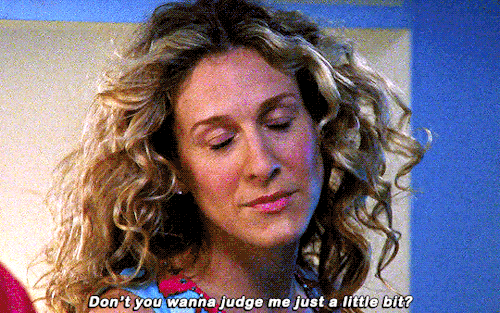
She throws away her power with Mr. Big. She totally forgets that she has the power to say "It's over!"
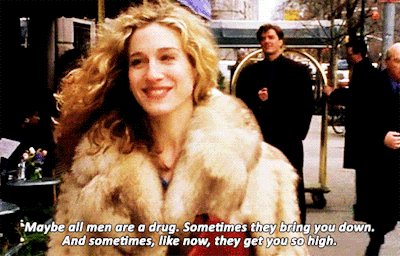
Magnetic. Pluto in 7th house can have a love hate relationship with the public and I think that Carrie is the only character in the show that you either love her or hate her.
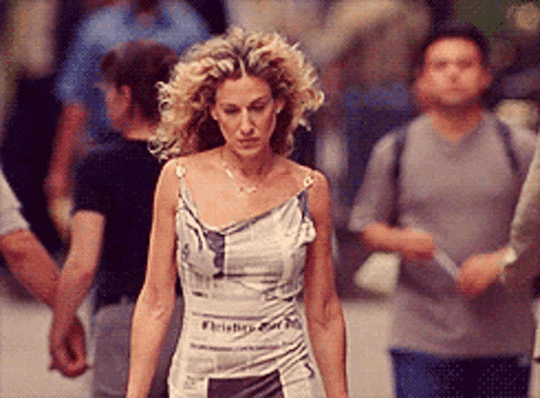
#carrie bradshaw#satc#90s series#miranda hobbes#samantha jones#charlotte york#chris noth#sex and the city#new york city aesthetic#new york#astrology aesthetic#pluto aesthetic#pluto astrology#pluto in 7th house#astrology observations#character analysis
8 notes
·
View notes
Text
Dynamic Analysis of SilverFlint and the Parallels with Take Me To Church by Hozier
(Also could be titled as: Flint needs a hug and therapy)
I associate this song with silverflint—especially Flint—not through a religious turmoil or religious trauma sense (shocking, honestly, considering I’ve spent every English class in college exploring religious trauma and the appearances of religion in media). I’d argue, in fact, that both of their stances on religion are left extremely ambiguous for a reason. Audiences assume through canon-period education and beliefs that they were both almost definitely some type of religious, but I believe it to be entirely unrelated to Flint’s shame.
In fact, it was never meant to be about anything but Flint’s relationship with his own self-actualization and self-image. Thomas existed as a direct challenge to that, by redefining what it means to be a man—or, rather, to be masculine—and to also be true to himself.
Silver, on the other hand, existed as a challenge to the man he became once he had fully internalized that shame and unbalanced the perfectly crafted idea Flint had of himself. Silver was always intended to make Flint reconsider who he was trying to prove himself to, and if that person was actually himself.
Now, to get into the actual point of this. Throughout, I choose to connect “She” to two different people: Miranda and Silver, and I also connect Heaven to England and the Navy, or even in a broader sense, society and civilization as a whole.
My lover's got humor / She's the giggle at a funeral / Knows everybody's disapproval / I should've worshiped her sooner / If the Heavens ever did speak / She's the last true mouthpiece
In this portion, “She” is Miranda, and we will see a swap from her to Silver later through the song. In the flashbacks to when he and Miranda were first becoming involved, she told him to exist without fear of the consequence of a rumor. In part, it heavily motivated his shame early on, at least, with Miranda and her being a married noblewoman. She lived without a care for the danger involved and would stare consequence in the face before hiding from it. “She’s the giggle at a funeral / I should’ve worshipped her sooner” is her death, though the funeral, I’d say, is the death of who they were before leaving England. She’s the final source of joy for Flint, and his final lifeline to Thomas and what Flint used to be. However, she is the “last true mouth piece” and carries the final reminder for Flint that they are not, and have never been, home in Nassau. It’s the remaining grasp of England and of what he used to be.
Every Sunday's getting more bleak / A fresh poison each week / "We were born sick", you heard them say it
This is Flint’s final descent into piracy, and choosing to let shame consume him in a way that functioned as a motivator for vengeance. The “poison” being the ideology and back-and-forth nature of England’s interests being the abolition of piracy, but will refuse to stand on the shores of Nassau and understand why pirates exist. Their sickness is the refusal to become part of England, and how the sins of men committing acts of piracy were simply part of them and it was unavoidable, predetermined and in their nature, and the good men and women of England would never dare to be so horrific. Hence why Flint was always a major threat, because he was a good man of England. This is why Peter Ashe needed to use a literal smear campaign against him, by him, and spoken from him to abolish piracy. Because, then, no man would choose piracy, as the strongest of them all was still just a sinful man who dared to love another man. But if they hid it, if they just told people that they would pardon pirates, and Flint, well, not a single person could accept that because they had been told of the monsters of Nassau and the terrifying Captain Flint.
My church offers no absolutes / She tells me, "Worship in the bedroom"
This is simple: Miranda is the church (his home) and this is when she tells him they will leave instead of fight to free Thomas. In this, she reinstates his shame and directly contradicts everything he believed of her.
The only Heaven I'll be sent to / Is when I'm alone with you / I was born sick, but I love it / Command me to be well / A-, Amen, Amen, Amen
This is where Silver enters the dynamic, but just a little. I think this encompasses all of their relationship. First, when Flint falls in love: “The only Heaven I’ll be sent to / Is when I’m alone with you” with “you” being Silver (also his shame, by the way, since the unbearably exist as a whole to Flint) and “heaven” being his realization that Thomas is never coming back, and that Nassau and Miranda were never going to be a replacement for the way he feels when he loves a man. Silver reteaches him why shame stopped mattering, but he brings with him the understanding that the shame have never once went away entirely. He learned with Thomas how to exist with love and shame at the same time, and that it was okay to be afraid of how he felt, but that it wasn’t an excuse to suffer without the thing he needs most. “I was born sick, but I love it” is Flint knowing that what he feels about his love for men, Thomas and Silver, particularly, is always going to be shadowed by what he was taught to feel about it, and also what he has done because of it. Finally, “Command me to be well” is Silver standing in the forest with him, begging him to leave there with him and to leave the war behind. Quite literally, Flint needed to be commanded to stop, but he always managed to find himself being the commander. Flint, in my opinion, had always wanted to be forced to end the war or his life in some way, and Silver eventually gives him that.
If I'm a pagan of the good times / My lover's the sunlight
I think this is Flint’s description of his love for Thomas. But I’m still on the fence about this, too, as it could be his description of Silver. However, later verse works better, imo.
To keep the Goddess on my side / She demands a sacrifice / Drain the whole sea / Get something shiny / Something meaty for the main course / That's a fine looking high horse / What you got in the stable? / We've a lot of starving faithful
There are two meanings to “To keep the Goddess on my side / She demands a sacrifice” and both gut me, so I will share them both.
Firstly, it could be construed as a direct reference to Miranda finding Thomas’ father and having Flint kill him, and how he felt as though without the sacrifice, it would have been a betrayal to her, Thomas, and himself.
Secondly, this (and the rest of the verse, really) is Silver’s point of view of Flint’s (the “Goddess”) war. I think it drains him in a way he was never able to describe until he’s got Flint at gunpoint. Everything with Flint was more than he had bargained for, and he watched the crew give up every ounce of themselves for the cause, people died for the cause, homes burned for the cause, and yet, it wasn’t enough. It’s his realization that Flint, even if he won Nassau would find that (to use Flint’s words) “her comfort will grow stale”, and would never truly rest until he saw everything burn.
That looks tasty / That looks plenty / This is hungry work
If Flint could put into words what the “the darkness” he and Silver possess would say and sound like, this is what it would say. He looks out upon Nassau, and England, and Charles Town, and realizes to himself that nothing would ever burn hot enough to satisfy the rage inside of him.
Take me to church / I'll worship like a dog at the shrine of your lies / I'll tell you my sins so you can sharpen your knife / Offer me my deathless death / Good God, let me give you my life
The moment where Flint, in the cages, chooses to sacrifice himself for the cause and for the lives of his crew and Silver, he’s accepted it. He’s accepted death, he’s accepted Silver, and he’s accepted shame. I think this is also how he felt when he had first agreed to Peter Ashe’s offer to smear his name to bring Thomas’ vision to reality and free himself from being trapped in this never ending loop of rage and turmoil. I think, this, is Flint in his weakest moments, wishing his sacrifice could be enough to end it all. That, maybe, his death would end it all, once and for all, and he could rest without being tormented by it all. By England, by shame, by sacrifice.
No masters or kings when the ritual begins / There is no sweeter innocence than our gentle sin
So, this one hurts. This is Flint’s love. In every single way, this is his love. Every part of it, tainted with shame, but knowing that if it is love, then, it must also be right. “No masters or kings when the ritual begins” with the “masters or kings” being first, England, and second, the worst parts of himself, and the “ritual” is the involvement with Silver. I would even argue that Flint’s acceptance of shame is that which completely removes it’s power over him, and it took Thomas’ death and his words inscribed into a book for Flint to realize that there is nothing more beautiful than their love, and his and Silver’s love. I think, also, this is his ode to the man he once was, and understanding that the only place that person exists at all is when he is alone with the man he loves.
In the madness and soil of that sad earthly scene / Only then I am human / Only then I am clean / Oh, oh, Amen, Amen, Amen
And finally, I would, to my own dismay, connect this to the idea that Flint is dead. Alternatively, Captain Flint is dead, he’s forced out of piracy, and learns to love without fighting with England for the loves he had already lost. Either he is with Silver, or he finds someone else, but in it’s totality and conclusiveness, Flint is gone.
After all, I think that’s what he wanted and had no way to accept it. He couldn’t accept doing nothing, because that would have left him giving up on the idea and memory of every death and sacrifice. Silver sees it, too, with his line of “It must be awful being you,” and he knows, truly, that Flint is literally suffering at the hands of his own war, his own cause. Because there was simply nothing else to do, and to sit, alone, with his feelings? Process Thomas being gone and accept it instead of exacting revenge? He couldn’t reconcile the fact that grief never stops existing, and that love persists in the person who lives when the other is dead. Flint remained a servant to his grief and patched it with rage because if he had a reason to fight or to steal or to kill, then he had a reason to never accept that the people he loves are dead. Flint never had to accept that his love killed everyone he cared about.
#black sails#silverflint#james flint#john silver#captain flint#internalized homophobia#character analysis#relationship analysis#thomas hamilton#flinthamilton#flinthamiltons#miranda barlow#miranda hamilton#james mcgraw#my writing#essay#my gearing up for college essays is me writing this in the span of two hours and leaving it largely unproofread and unedited#take me to church#hozier
26 notes
·
View notes
Text
Usually whenever I see people say “Alma didn’t directly apologize to Bruno”, I go…..yeah you’re right, but I feel like a lot of people are forgetting this moment.
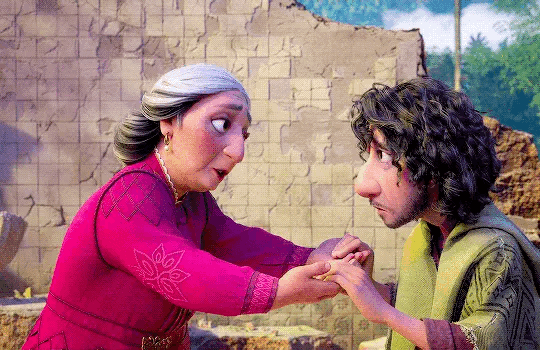
After Alma realizes her faults, she comes back to the broken casita with Mirabel, and sings towards the whole family, but more importantly, she welcomes Bruno back. She takes his hands, looks him in the eye, and shows him that she NOW knows her mistakes and that every member here is worthy, (including him of course) and that their gifts aren’t the miracle. It’s not a flat out apology towards him specifically, but she herself told the whole family “I’m sorry I held on too tight”. She welcomes Bruno, immediately hugging him, and she shows everyone that her eyes are open and her outlook has changed, and that’s a good thing! So even though she never specifically said “I’m sorry Bruno”, that doesn’t mean she’s being in-denial of what she did and shunning him out, it’s the opposite in fact. Of course, they’re probably not going to heal quickly, they have a lot to talk about, to make up for lost time, and I think the writers are smart enough to know that. When the family rebuilds their house, it isn’t just them saying everything is okay, it’s them admitting that they have made a new foundation, and that in time, they’re all going to heal, expect they know NOW that they’re not alone, and that they can all work together to be better. Just like the directors have said, family can be messy, and it’s going to be messy from time to time. However, that doesn’t mean their isn’t light, isn’t hope for a better way, a better life. While some have wished Mirabel or Bruno would cut off Alma, this movie teaches you not to FORGIVE your abusers like a lot have been saying, but rather teaches you that anyone is capable of changing, anyone is capable of getting better, of BEING better, of healing and growing as people, as a family than they once were. Everyone has their own demons, their own faults and imperfections, but that doesn’t mean all hope is lost, or that their can’t be a reconcile. And even if you don’t agree, or don’t think the film handled a message like this well, hopefully we can all agree that this movie is certainly a good START when talking about these complex themes towards kids and adults. 💚❤️
#encanto#jared bush#walt disney animation studios#disney’s encanto#lin manuel miranda#mirabel madrigal#walt disney#bryan howard#disney animation#encanto mirabel#bruno madrigal#Encanto Alma#Alma madrigal#encanto movie#disney characters#Disney analysis#generational trauma#themes#encanto themes#Abuela Alma#Encanto Bruno
220 notes
·
View notes
Text
„If you knew my father, you would understand. I wasn‘t the first one he made, I was only the first one he kept. I was brought up up with no friends, pushed to impossible demands. I wasn‘t a daughter to him. I was- I don‘t know what I was.“
That line hit me so hard. Miranda is hardly the type of person to falter. But here she pauses in her speech. She stumbles. She has no words to describe how insignificant she was to her father as a person.
18 notes
·
View notes
Text
Some Miranda Blossom details in Elden Ring
Example of using Rowa Fruit Bushes to read the environment, at a location North of Waypoint Ruins. This is one of the classic cases of 2 Rowa Bushes close together.
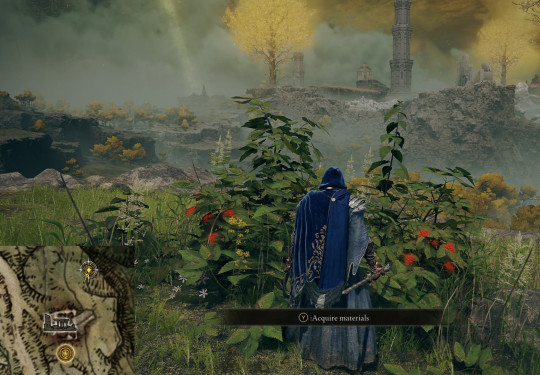
From the south bush there is nothing significant that I know of - shown below for point of comparison.
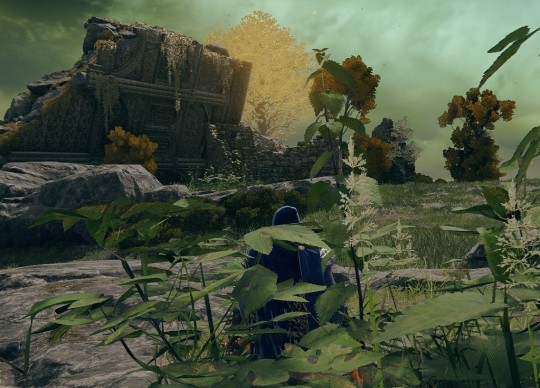
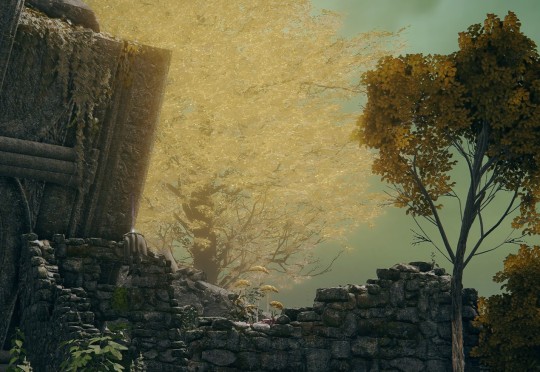
But standing at the north bush there are two subtle changes in the environment:
1) The anthers of a Miranda Blossom can be seen right at the base of the trunk of the Weeping Peninsula Minor Erdtree.
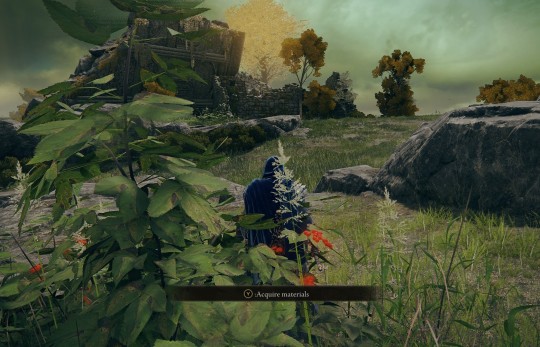
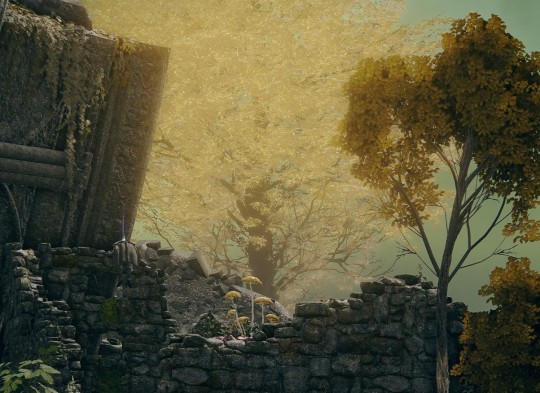
2) One of those poles with crucified victim and a seeking soldier at its base are revealed from behind the rock to the west.
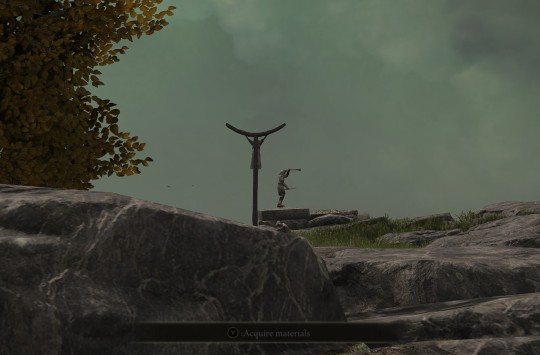
This is by far not the only case where Rowa Fruit Bushes seem to be placed in a way that subtly highlights elements of the environment. But most Rowa Bush spots are hard to present in a text post so I mostly have them shelved for now. See other post with an area thoroughly examined for observations from mushroom vantage points.
I would rather highlight a point of parallel between this Miranda Flower in Limgrave and one in the Weeping Peninsula. In Limgrave the Miranda Flower is outside the access point for Waypoint Ruins where Sellen can be encountered as a vendor (and also a point of interest is that Sellen is standing just to the south of the square-shaped boundary where spirit summoning can be done on the surface).
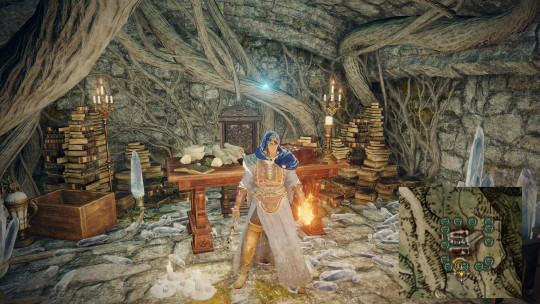
In the Weeping Peninsula Tombsward Cave with the Miranda Blossom boss at its end runs underneath Witchbane Ruins where Sellen is kept as a prisoner, and in a poison swamp that mirrors the one in the cave system below. In fact, from examining the environment the start of the underground poison stream begins directly under the room where Sellen is kept. It's almost as if the stalactites are drip dripping the poison from the surface swamp into the underground, and the underground stream drains to the west towards the Miranda Blossom chamber.
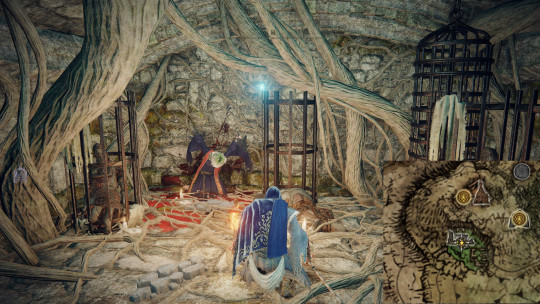
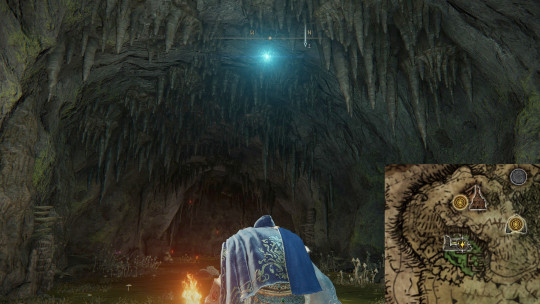
Also I think that the name on the Wiki is wrong/outdated? It says "Miranda the Blighted Bloom" but the nameplate here just says "Miranda Blossom" in the present version. There are some nice pink flowers in this room that are either uncommon or not found anywhere else:
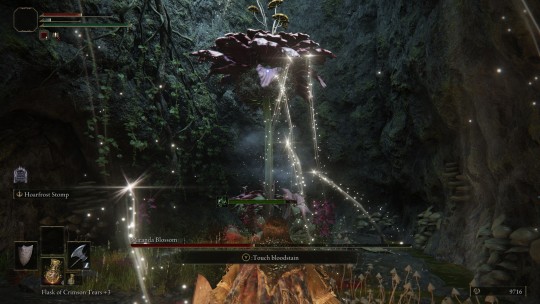
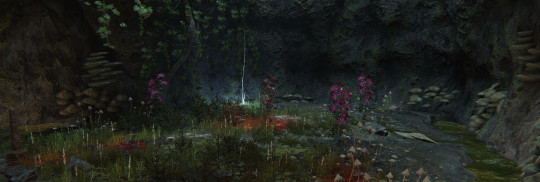
To think one step further, this Miranda Blossom drops the Viridian Amber Talisman, which has the motif with dual meaning of crossed roots - the foundation of a growing plant - and worked in the shape of a skull with mouth stitched shut - an recurring motif of secrecy.
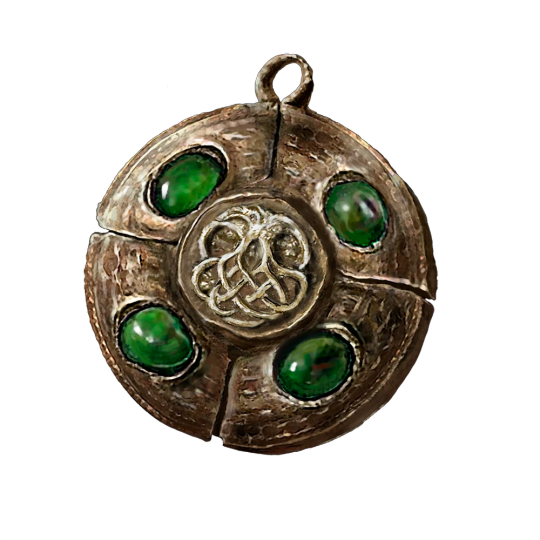
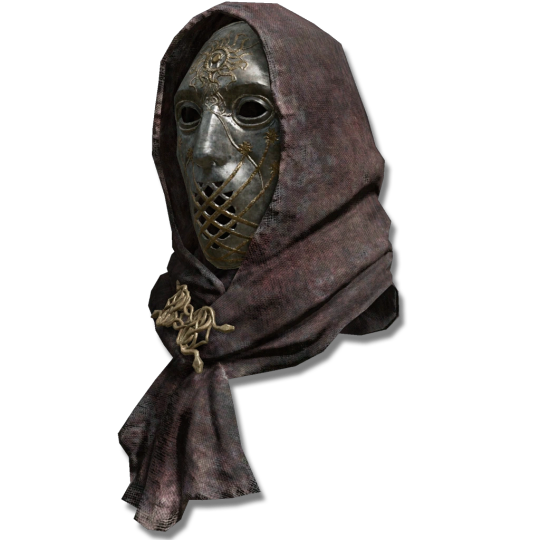
#elden ring#environmental storytelling#elden ring lore#analysis of art design#an environment detail I noted some time ago and just thought to try and examine a bit more closely#Since stuff about the theoretical 'flower crucible' had come up recently#Miranda blossoms are all anther and no pistil huh
5 notes
·
View notes
Text
The Bard/Prince and Character Arcs
The defining question for the Bard/Prince is how will they rule? Whether they are ruling a kingdom, a community, or even a small group of their own friends, the Bard/Prince is a ruler and leader. No matter if the position was sought out or foisted upon them, the Bard/Prince has a duty to lead, and to lead well. Failure to do so can only mean doom for their citizens.
Setting
Just like the more powerful of the material classes, the Bard/Prince lives in a world seemingly at peace. While everyone else may be content in their world, the Bard/Prince can sense a cataclysm hitherto never seen before knocking on the door of their world. The Bard/Prince knows that this is the stage upon which they must act.
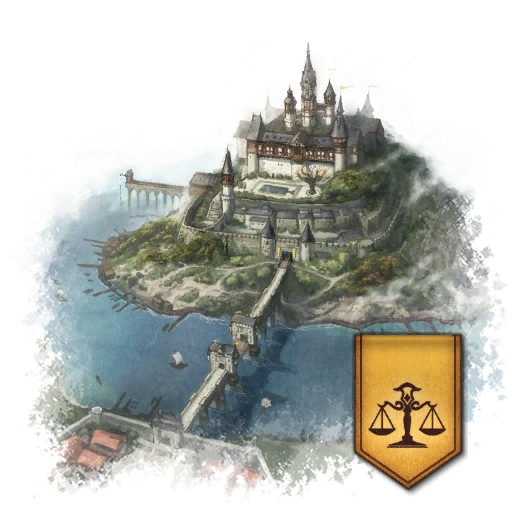
Whether through actions or birthright, the Bard/Prince is hailed as a leader by their people. This distinction makes them separate from the world. They and they alone are responsible for how the world moves through this perilous time.
Internal Conflict
The internal conflict of all Bard/Prince characters revolves around fear and ego. While they may seem opposites, ego is really the mask that covers fear. And fear is the shivering innards of ego. The Bard/Prince must seek humility and an understanding of the limits of their power in order to resolve the conflict.
Usually, this conflict is externalised in how others treat them. If led by fear, their citizens will mock them. If led by ego, their citizens will fear or threaten them.
External Conflict
The external conflict is against the cataclysm. Most of the effort will go towards preparing for it, and acknowledging the concessions that must be made. Not all things can be saved.

Usually, this conflict ends in a sacrifice on the part of the Bard/Prince. This is the only way that the world can survive. It ties nicely into the humility that the Bard/Prince learns in their internal conflict.
The Bard
The Bard answers the question of ruling by absconding. They will not rule. Someone else will step up and do it for them.
Bards still hold immense power, or at least the image of them would. This makes them the perfect candidate for becoming a puppet ruler. A joke to citizens and a servant to forces greater than themself.
Examples
Gamzee Makara is a Bard that refuses to take up the mantle of leader in his session. He turns to excessive drinking in order to escape his responsibilities. But because he is still a respected figure in his friend group, this leads to the session devolving into chaos. He later submits all his powers to raising Lord English, leading to the cataclysm in the main storyline of Homestuck.
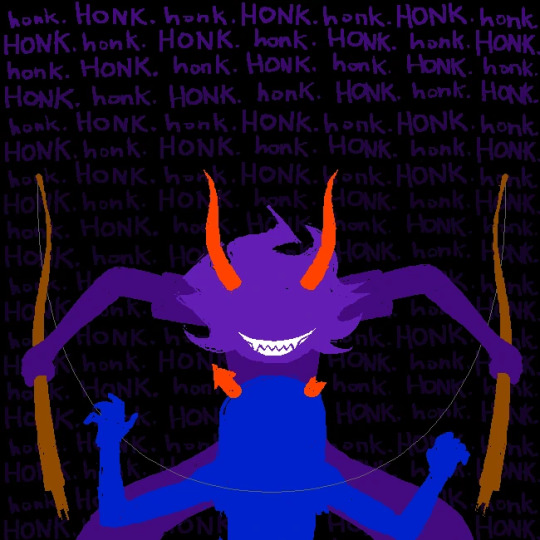
Roland Glenbrook from Triangle Strategy is another example. Roland refuses the responsibilities of his position, constantly pushing it onto someone else. His world is consumed by the cataclysm of the war, and most of his country falls into disarray due to this event. He feels the pain of his citizens but refuses to stand for their liberation, hiding in shadows instead. If he got his way, he would even allow his citizens to suffer under the rule of Hyzante instead of taking the role of King himself.
End Goal
The end goal of the Bard is to take up the mantle of leader while still acknowledging their own fallibility. Bards generally reject the role of leader because they know their own short-comings all too well. But no one is perfect, and a green leader is better than no leader at all.
Roland becomes king in the Golden Ending and takes proactive steps to safeguard the peace in Norzelia. He doesn’t try to take over the other nations and still acknowledges he isn’t the best suited to be king. However, when the responsibility falls to him, he does not shirk from his duty, and tries his best at a role he never expected to inherit.
The Prince
The Prince answers the central concern by meeting it and exceeding it. They will rule with a strong vision and an iron fist. They are the only one fit to rule the land, and they will sacrifice all to keep this position. It is for the greater good, afterall.

Because they are so convinced of their infallibility, they are frequently an oppressive ruler instead of an uplifting one.
Examples
Eridan Ampora is a prime example. He sees himself and all the waterkin as the only ones capable of being leaders. He refuses to acknowledge the limits of his social capital and uses force to get his way. His actions lead to the deaths of his fellow players, the destruction of the matriorb, and did nothing to prepare them for the coming of Jack Noir or Lord English. In fact, he may have sabotaged any attempts to prepare for the coming cataclysm.
Miranda Priestly from The Devil Wears Prada is another great example. When Miranda is faced with her forced retirement, she doesn’t recognise the waning of her powers and the beginning of a new era. She bullies, threatens, and sacrifices the livelihoods of her own employees in order to keep her position. While the cataclysm is staved off, it is far from over. Irv will attempt to replace her again and again in the coming years until Miranda has sacrificed all her pawns and be faced with a kingdom (Runway) that is in shambles.
End Goal
The end goal of the Prince is to let go of power. They are fallible, just like all others. And through their own self-sacrifice, they can usher in a new era gracefully, with minimal damage to their citizens.
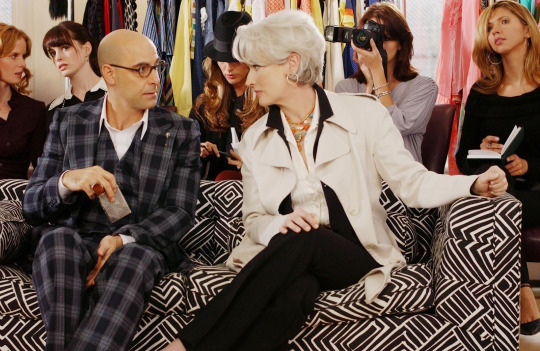
For Miranda, she could have completed her character arc if she stepped down from Runway and gave her position to Nigel. She had groomed him for such a position and clearly found him to be the most capable of the creative team. This action would have also appeased Irv, as her high-budget version of Runway would be replaced by a new vision.
Conclusion
At the end of the day, the Bard/Prince are leaders forced to face their own mortality and the fact that all things must change. As they figure out how they’ll lead, they also plan how they’ll relinquish power.
Hopefully by the end of the journey, they will find humility and no longer be ruled by fear and ego. Through this journey, they can be hailed as a beloved leader of their time. However, the losses are great should they fail, as they can actively contribute to the oncoming cataclysm. If the Bard/Prince does not learn humility and courage, they could destroy all they care about in their quest to secure stability or power for themself.
#classpect#bard#prince#bard of rage#prince of hope#homestuck#gamzee makara#eridan ampora#equius zahhak#triangle strategy#roland glenbrook#kingdom of glenbrook#lord english#the devil wears prada#miranda priestly#nigel#story theory#analysis#my thoughts
40 notes
·
View notes
Text
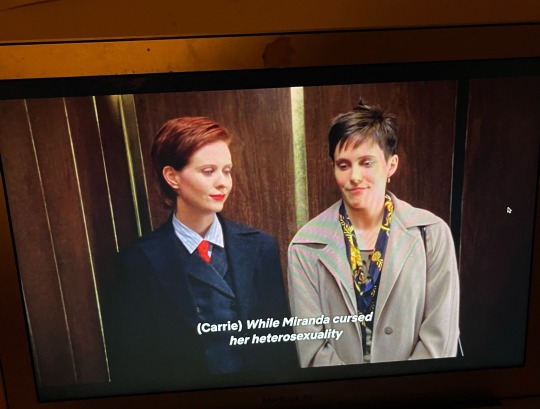
did she??
#doing a lesbian miranda analysis & there are like 25 data points an episode#the show is a little smarter than I thought it would be#and also. so. ‘90s.#sex and the city#miranda hobbes
2 notes
·
View notes
Text
going insane bc of the parallels between marguerite baker and mother miranda + their connection to eveline
#i’m going to have to write a whole analysis piece but i can’t stop thinking about it#*bc#resident evil#resident evil village#resident evil 7#marguerite baker#mother miranda#eveline re7
24 notes
·
View notes